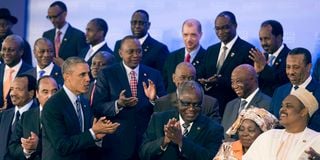US-Africa ties must go beyond rhetoric

Former US President Barack Obama with former and current African leaders during a group photo at the US - Africa Leaders Summit in Washington, DC on August 6, 2014.
Next month, President Joseph R. Biden will host African heads of state and government. Beginning on December 13, 2022, and for three days, the United States will showcase its longstanding commitment to the African people, and reinforce mutual relationships, including seeking cooperation in several areas.
According to the White House, the US-Africa Leaders’ Summit will focus on several thematic areas, mostly routine: economic engagement; peace, security and good governance; democracy, human rights and civil society; regional and global health security; food security; the impact of climate change; diaspora affairs; as well as education and youth leadership.
Such a large gathering of African leaders remains a rarity to the Americans, for it’s just the second time that it is happening. The first summit was convened by President Obama in 2014. That meeting happened against the backdrop of the Arab Spring fallout, which included the horrific murder of the Libyan leader and the ensuing chaos in the Sahel region.
Ukrainian war
As for the raging Ukrainian war, some expect President Biden to attempt to galvanise Africa’s support for Ukraine and NATO. This meeting may have also been necessitated by the growing opposition to the American political, military and economic hegemony by the Russians, Iranians, North Koreans, Chinese and others. There is open defiance and resistance to the predominant US-led multilateral architecture, political and financial institutions, models and norms.
It is not quite clear if the summit will achieve any of its stated and unstated objectives. Not only is Africa fragmented politically, but some of its countries have become more assertive. Beijing’s deepening political, commercial and financial ties with African capitals have steadily pushed the Americans and their western allies to the side. Also, there is an acknowledgement that the involvement of the Russians in the Sahel has accelerated the rejection of the French in several countries, a situation that could get worse.
There is no question that Africa is grateful for the US supporting peace efforts, making available trade opportunities and its generous humanitarian and development assistance. However, Africans perceive their relationship with the West as unbalanced, even exploitative.
Western multinationals have extracted and profited enormously from Africa’s minerals, including precious stones and hydrocarbons, yet they have done very little to benefit local economies and populations. The proliferation of Western-supplied arms and light weapons often supplied to secure these minerals, have killed millions of people on the continent.
Furthermore, Western powers have supported brutal dictatorships and regimes — making a mockery of their talk of democracy and human rights. In Libya, forced democratisation through military campaigns destroyed a once vibrant and thriving country and created an environment whose conditions have contributed to the radicalisation of the youth, religious extremism and even terrorism.
If Biden’s goal is to counter America’s opponents on the African continent, then the Americans must go beyond rhetoric. Not much came out of Obama’s 2014 summit. There has been no meaningful “stimulation of growth, unlocking of opportunities, or the creation of an enabling environment in Africa for the next generation”, which were rather praiseworthy objectives of the then summit.
The Chinese have largely succeeded because of their non-confrontational approach. They neither impose their values nor demand acceptance and adoption of their way of life. Instead, Beijing strives to reassure the Africans that their culture, customs and belief systems are not inferior. It is prudent for the Americans to likewise adopt a tolerant stance, and be less patronising, or even condescending.
Illicit financial flows
As rational beings, Africans seek value for their minerals, which have been appropriated historically by the Americans and others. While corruption is a problem that must be confronted, there is an acknowledgement that illicit financial flows — from Africa to Western economies — have contributed to keeping Africa underdeveloped.
The US must demonstrate a willingness to end this wanton pillage. The Chinese have shown that small, piecemeal infrastructure projects are often costly and inadequate and that Africans are not too poor to afford modern railways, seaports, airports and highways.
Americans should help Africa meet its infrastructure deficit by embracing a continent-wide approach to development. Large-scale projects, such as continental systems of railways or highways, can help accelerate intra-Africa trade, and open new investment frontiers to American investors. To beat the Chinese, Americans must be more pragmatic and less rhetorical.
Mr Chesoli is a New York-based development economist and global policy expert.





